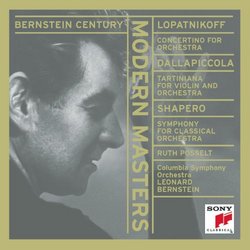| All Artists: Nikolai Lopatnikoff, Harold Samuel Shapero, Leonard Bernstein, Columbia Symphony Orchestra Title: Bernstein Century Modern Masters Members Wishing: 1 Total Copies: 0 Label: Sony Release Date: 11/24/1998 Genres: Jazz, Classical Styles: Forms & Genres, Concertos, Historical Periods, Modern, 20th, & 21st Century, Symphonies Number of Discs: 1 SwapaCD Credits: 1 UPC: 074646072523 |
Search - Nikolai Lopatnikoff, Harold Samuel Shapero, Leonard Bernstein :: Bernstein Century Modern Masters
 | Nikolai Lopatnikoff, Harold Samuel Shapero, Leonard Bernstein Bernstein Century Modern Masters Genres: Jazz, Classical
|
Larger Image |
CD Details |
CD ReviewsA Tremendously Exciting Symphony R James Tobin | Milwaukee | 11/30/1999 (5 out of 5 stars) "The original appearance of this recording of Harold Shapero's Symphony for Classical Orchestra, the major work on this disc, and the outstanding work by this composer, was once listed in Schwann's Basic Record Library. Written in 1947 (and recorded in the early Fifties) the work represents American neoclassical symphonic style at its peak, before that movement was shunted aside by serialism. The work shows the influence of both Beethoven and Stravinsky--but it speaks very much with the voice of Shapero. It has tremendously exciting rhythms, clear textures, and harmonies that are satisfyingly pungeant (and never abrasive.) The poignant Adagietto soars, with a long-lined high trumpet solo that is achingly beautiful. The Finale has headlong momentum. Longer than most symphonies from the classical or neoclassical periods, to my ears it does not go on a moment too long.The Bernstein recording was one of his first, done with a pickup orchestra of New York musicians. Originally on Columbia, it reappeared on CRI in the 1980's and is happily now available as part of the Bernstein Century series on SONY. In its momentum and taut control, this performance strikes me as notably more exciting than the performance by Previn, who revived this work a few years ago and, despite its age, the recorded sound is quite satisfactory.The other works on the disc are of some interest but, for me, the CD is worth having just for the Shapero." Buy it for the Shapero 07/11/2001 (5 out of 5 stars) "The Shapero Symphony is the reason to buy this cd. Previn's version may be much better recorded and somewhat better played, but Bernstein's interpretation brings greater committment and sparkle. The Shapero symphony deserves to be much better known than it is (and not just due to the surpassingly beautiful second movement). Highly recommended." Derivative and epigonic, but enjoyable nonetheless, and a mu Discophage | France | 05/03/2007 (4 out of 5 stars) "If you kike the orchestral music of Paul Hindemith (I do), you are likely to enjoy Lopatnikoff's Concertino for Orchestra from 1944: it is an imitation (they call it "influence"). Nikolai Lopatnikoff was born in Estonia in 1903 and became an American citizen in 1944, the same year he wrote this Concertino. As Bernstein, he was a protégé of Koussevitsky, who premiered a number of his works.
If you like Webern's transcription of Bach's Ricercare, or the Baroque-inspired ballets composed for Diaghilev and the Ballets Russes in the 1920s (of which Stravinsky's Pulcinella is the most famous, but hardly the only one), you might enjoy Dallapiccola's "Tartiniana" for violin and orchestra. Composed in 1952, it is based on four violin sonatas by Giuseppe Tartini, but it sounds like Bach as it was played in the1950s: solemn and somewhat lachrymose, though with some sudden and slightly jarring (and consequently interesting) spurts of dissonance. But 25 years later Alfred Schnittke did much better with his First Concerto Grosso. The piece is not very typical of its composer: Luigi Dallapiccola (1904-1975) was viewed as bridging the gap between Italian lyricism and Schoenberg's cerebral and stern organization - a lyrical serialist, or a serial lyricist, as you prefer. If you like the music Stravinsky composed in the 40s and early 50s, before his "conversion" to serialism, and especially "The Rake's Progress" (I do), you are likely to enjoy Harold Shapero's Symphony for Classical Orchestra (1947): it is an imitation. Aaron Copland also thought so. While praising the composer, he wrote in 1948 that "Stylistically, Shapero seems to feel a compulsion to fashion his music after some great model. ... he seems to be suffering from a hero-worship complex -- or perhaps it is a freakish attack of false modesty..." As the Rake's Progress, the Symphony is gay, colorful and dynamic. The use of an orchestra of classical dimension imparts it a commendable light-footedness. Derivative and epigonic music, then, but enjoyable nonetheless. Music, after all, is not all about originality: it can also be about pleasure. I personally love "The Rake's Progress" so much, I can never have enough. So if Stravinsky, for reasons known only to him, decided to write a symphony in the same style under a pen-name, why turn it down? These recordings are among the first young Leonard Bernstein did for Columbia records , at the beginning of 1953. It is great to have them back on CD. These are hardly indispensable pieces in the history of 20th century American music, but for the Bernstein fan (I am), this disc is a must. " |

 Track Listings (11) - Disc #1
Track Listings (11) - Disc #1